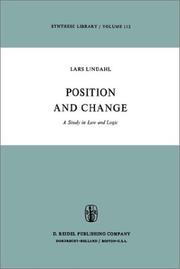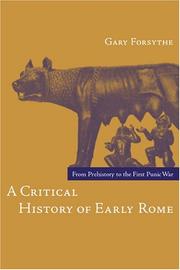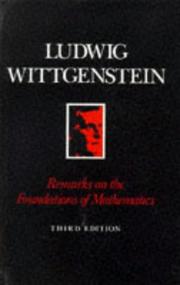| Listing 1 - 10 of 605 | << page >> |
Sort by
|
Book
ISBN: 9629379023 9789629379025 9789629372378 9629372371 9629375230 Year: 2015 Publisher: Hong Kong
Abstract | Keywords | Export | Availability | Bookmark
 Loading...
Loading...Choose an application
- Reference Manager
- EndNote
- RefWorks (Direct export to RefWorks)

ISBN: 9027705577 9789027705570 Year: 1976 Publisher: Dordrecht Reidel
Abstract | Keywords | Export | Availability | Bookmark
 Loading...
Loading...Choose an application
- Reference Manager
- EndNote
- RefWorks (Direct export to RefWorks)
Logic --- 510.6 --- Mathematical logic --- 510.6 Mathematical logic
Book
Year: 2004 Publisher: Project Gutenberg
Abstract | Keywords | Export | Availability | Bookmark
 Loading...
Loading...Choose an application
- Reference Manager
- EndNote
- RefWorks (Direct export to RefWorks)
Rome --- History --- Republic --- 510-30 B.C.
Book
ISBN: 0444106790 0720422833 9780444106797 9780720422832 Year: 1975 Volume: 82 Publisher: [Place of publication not identified] Elsevier
Abstract | Keywords | Export | Availability | Bookmark
 Loading...
Loading...Choose an application
- Reference Manager
- EndNote
- RefWorks (Direct export to RefWorks)
Philosophy --- Philosophy & Religion --- Logic --- 510.6 --- Logique mathématique --- 510.6 Mathematical logic --- Mathematical logic
Book
ISBN: 0471490334 9780471490333 Year: 1967 Publisher: New York Wiley
Abstract | Keywords | Export | Availability | Bookmark
 Loading...
Loading...Choose an application
- Reference Manager
- EndNote
- RefWorks (Direct export to RefWorks)
Mathematical logic --- Logic, symbolic and mathematical --- 510.6 --- 510.6 Mathematical logic --- Mathematics --- Philosophy --- Mathematics - Philosophy
Book
ISBN: 9781107074064 9781139696487 9781107423985 1107074061 1107423988 1139696483 1316120562 1316121658 1316128199 1316129284 1316130371 1316131467 1316132552 1316133648 1322521689 Year: 2015 Publisher: Cambridge Cambridge University Press
Abstract | Keywords | Export | Availability | Bookmark
 Loading...
Loading...Choose an application
- Reference Manager
- EndNote
- RefWorks (Direct export to RefWorks)
Cosmology is in crisis. The more we discover, the more puzzling the universe appears to be. How and why are the laws of nature what they are? A philosopher and a physicist, world-renowned for their radical ideas in their fields, argue for a revolution. To keep cosmology scientific, we must replace the old view in which the universe is governed by immutable laws by a new one in which laws evolve. Then we can hope to explain them. The revolution that Roberto Mangabeira Unger and Lee Smolin propose relies on three central ideas. There is only one universe at a time. Time is real: everything in the structure and regularities of nature changes sooner or later. Mathematics, which has trouble with time, is not the oracle of nature and the prophet of science; it is simply a tool with great power and immense limitations. The argument is readily accessible to non-scientists as well as to the physicists and cosmologists whom it challenges.
Cosmology. --- Cosmologie --- 510.6 --- 510.6 Mathematical logic --- Mathematical logic --- Cosmology --- Cosmologie.

ISBN: 128235874X 9786612358746 0520940296 159875517X 9780520940291 0520226518 9780520226517 9781598755176 9781282358744 0520249917 9780520249912 Year: 2005 Publisher: Berkeley University of California Press
Abstract | Keywords | Export | Availability | Bookmark
 Loading...
Loading...Choose an application
- Reference Manager
- EndNote
- RefWorks (Direct export to RefWorks)
During the period from Rome's Stone Age beginnings on the Tiber River to its conquest of the Italian peninsula in 264 B.C., the Romans in large measure developed the social, political, and military structure that would be the foundation of their spectacular imperial success. In this comprehensive and clearly written account, Gary Forsythe draws extensively from historical, archaeological, linguistic, epigraphic, religious, and legal evidence as he traces Rome's early development within a multicultural environment of Latins, Sabines, Etruscans, Greeks, and Phoenicians. His study charts the development of the classical republican institutions that would eventually enable Rome to create its vast empire, and provides fascinating discussions of topics including Roman prehistory, religion, and language. In addition to its value as an authoritative synthesis of current research, A Critical History of Early Rome offers a revisionist interpretation of Rome's early history through its innovative use of ancient sources. The history of this period is notoriously difficult to uncover because there are no extant written records, and because the later historiography that affords the only narrative accounts of Rome's early days is shaped by the issues, conflicts, and ways of thinking of its own time. This book provides a groundbreaking examination of those surviving ancient sources in light of their underlying biases, thereby reconstructing early Roman history upon a more solid evidentiary foundation.
HISTORY / Ancient / General. --- Rome --- History --- Histoire --- To 510 B.C. --- Republic, 510-265 B.C.
Book
ISBN: 9789089980236 Year: 2010 Publisher: Kerkdriel Librero b.v.
Abstract | Keywords | Export | Availability | Bookmark
 Loading...
Loading...Choose an application
- Reference Manager
- EndNote
- RefWorks (Direct export to RefWorks)
Algebra is overal om ons heen en - of we dat nu beseffen of niet - hij vertegenwoordigt en beïnvloedt de wereld op veel manieren, van het aantal blaadjes aan een bloem tot de rente op je hypotheek. Bovendien kan de taal van wiskunde op zichzelf al prachtig zijn.Dit boek is een reis door de abstracte wereld van de algebra en de wiskunde. Het bevat wiskundige ideeën van over de hele wereld. Onderweg passeren namen als Pythagoras, Fibonacci, Galileo en Pascal de revue. Hoofdstuktitels als ‘Egypte, India en Perzië' en ‘De Italiaanse connectie' geven aan dat dit geen zwaar leerboek over algebra is. De wiskunde wordt niet sec gepresenteerd, maar er worden verbanden gelegd met de cultuur en de filosofie van de tijdperken waarin die stukjes wiskunde ontstonden. De auteur is docent wiskunde; hij weet hoe hij complexe stof bondig en levendig moet brengen. Deze reis door de geschiedenis van de algebra is doorspekt met anekdotes over personen, aansprekende voorbeeldopgaven en illustraties, zowel in kleur als zwart-wit. Steeds wordt in stukjes van twee pagina's een punt heel duidelijk gemaakt. De onderwerpen lopen van ‘soorten getallen' tot cryptografie. Al met al is dit geen leerboek dat veel oefening biedt, maar een heel motiverende smaakmaker voor de wiskunde.
510.3 --- Algebra --- Wiskunde --- Inleidingen - hand- en leerboeken (wiskunde) --- Algebra.
Book
ISBN: 0691073392 0691071926 9780691071923 9780691073392 Year: 1975 Publisher: Princeton (N.J.) Princeton university press
Abstract | Keywords | Export | Availability | Bookmark
 Loading...
Loading...Choose an application
- Reference Manager
- EndNote
- RefWorks (Direct export to RefWorks)
Entailment (Logic) --- Entailment (Logic). --- 510.6 --- 510.6 Mathematical logic --- Mathematical logic --- Logic --- Logic, symbolic and mathematical --- Logique mathématique

ISBN: 0631125051 Year: 1998 Publisher: Oxford : B. Blackwell,
Abstract | Keywords | Export | Availability | Bookmark
 Loading...
Loading...Choose an application
- Reference Manager
- EndNote
- RefWorks (Direct export to RefWorks)
| Listing 1 - 10 of 605 | << page >> |
Sort by
|

 Search
Search Feedback
Feedback About UniCat
About UniCat  Help
Help News
News